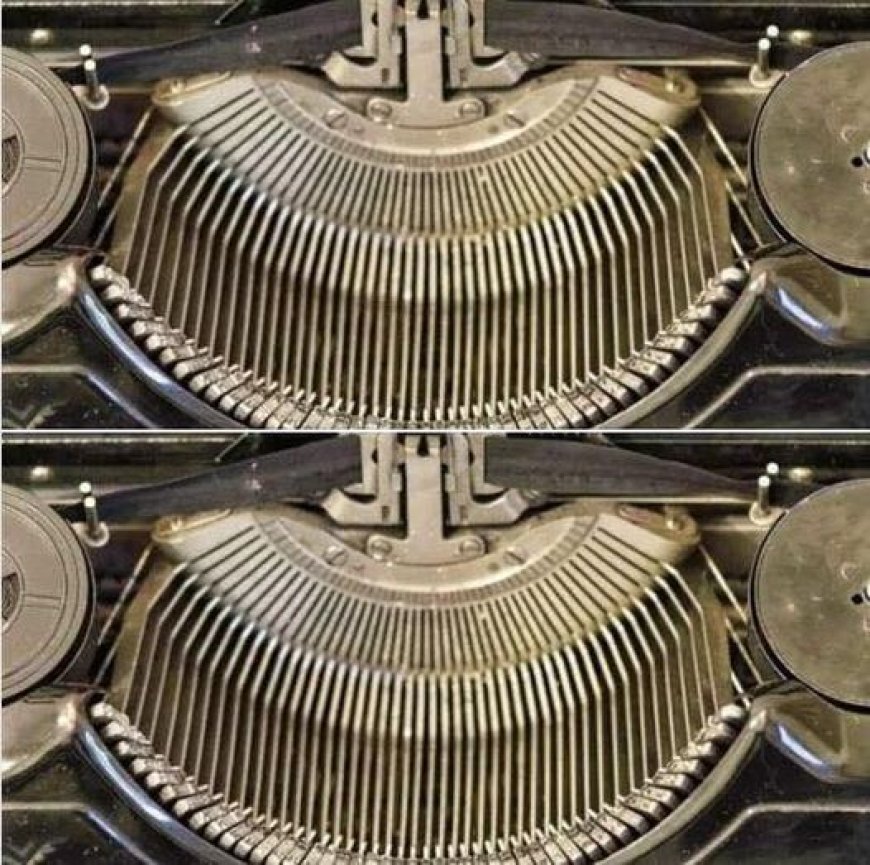Ninety percent. I’m not sure what this is… Please Share If You Know

Traveling Through Time: The Enchanting Story of Typewriters and Their Everlasting Appeal
A treasured reminiscence from my past, founded in my mother’s job as a diligent journalist, is etched firmly in my memory. It was when words were recorded gracefully on the keys of a typewriter, a gadget with a captivating allure. I sat on my mother’s lap, watching her fingers dance across the typewriter’s keyboard.
The aroma of paper combined nicely with the seductive scent of ink, creating an atmosphere of creation and remembrance.
These typewriters, each a work of art in its own right, housed an array of models individually created within their mechanical hearts. As I reflect, I’m compelled to inquire: do you, dear reader, own a typewriter?

Typewriters Unveiled on a Nostalgic Expedition
The humble typewriter is a melancholy symbol of a bygone era, a tribute to a different era of communication in a world where digital marvels and touchscreen thrills predominate.
The tactile resonance of keys striking paper bore witness to this dimension’s conveyance of thoughts and stories. In the following sections, we will look into the historical genealogy and the lasting legacy of these extraordinary writing devices.
Typewriters’ Ingenious Evolution:
Looking back, we find the seeds of mechanical writing contraptions sown in the 18th century. However, in the 19th century, functional typewriters began to emerge. The Sholes and Glidden typewriter, often known as the Remington No. 1, debuted in 1873 as a pioneering example.
With this development, a giant step toward mechanical writing was taken. The introduction of these early typewriters was marked by the “QWERTY” keyboard layout, which is still used on modern computers and smartphones.
A configuration was created with foresight to alleviate the problem of regularly jammed letter combinations in mechanical typewriters.
Communication and Society’s Ripple Effect:
The introduction of typewriters on the innovation stage caused ripples that spread far and wide, leaving an enduring mark on communication and society. A domain of influence that invites us to halt and reflect:
Increased Celerity and Efficiency: Typewriters forever changed the writing and document generation landscape. Typists’ skilled fingers orchestrated a symphony of faster invention, exceeding the old realm of handwritten transcripts.
This transformation’s fruits reverberated throughout workplaces and enterprises, heralding increased efficiency.
Document Homogenization: Each keystroke on a typewriter bore a mark of consistency, a uniformity that lent itself to documents filled with precision.
A feature that was especially important in constructing legal and official writings.
Championing Newspaper and Publication: With the introduction of typewriters, the rhythm of the newspaper profession quickened.
The rhythmic dance of keys cleared the door for the rapid compilation of news pieces, ushering in a new era in which newspapers emerged as the dominant source of information.
Typewriters extended the proverbial red carpet to a broader population, introducing them to the domain of professional writing and correspondence. The gradual drop in typewriter prices opened the door to many people.
Protecting Legacies: Typewritten documents withstood the test of time with a tenacity that their handwritten counterparts could rarely match. This unwavering fortitude was necessary to preserve historical records and literary treasures.
A Legacy Continued: A Glimpse Into Today’s Tapestry
Despite the digital wave pushing the typewriter to the sidelines, its legacy is still present and intertwined with modern themes:
Desirable antiquities: Vintage typewriters, drenched in the patina of yesteryear, have risen through the ranks to become sought-after antiquities. Their fascination stems from the stories they hold and the history they reflect, not just their design.
The resonant clatter of typewriter keys and the tactile communion between fingers and keys evoke the ghost of nostalgia. A tactile practice that some writers still cherish in search of a source of creative inspiration.
Artistry and Innovation: Infusing typewritten text into their works, artists, and designers combine the vintage spirit of typewriters with the palette of current creativity. A delicate dance between eras that gives rise to new life.
Typewriters have worn many hats, adorning the pages of literature, the frames of films, and the canvas of art. Their presence invokes bygone eras and lends these depictions a timeless aspect.
The typewriter’s rhythmic clinks echo amid peaceful writing retreats and immersive seminars. It is a tool for concentration and imagination, sparking creativity in individuals who use it.
The typewriter, a mechanical maestro who arranged prose and verse symphonies, continues to resonate through the halls of time. Its growth has been entwined with the progression of written language, from humble beginnings to sleek manifestations of utility.
Although the banner of technical growth has moved, the legacy of the typewriter continues to illuminate the paths of writers, artists, and lovers. We can see a palpable bridge connecting the domain of typing and the creation of writing on parchment in its clattering cadence. This bridge forever links us to our literary heritage.
The typewriter stands as an evocative tribute to the confluence of artistry and ingenuity, an emblem of an age that whispers its tale to those who listen as the curtains of history part.







